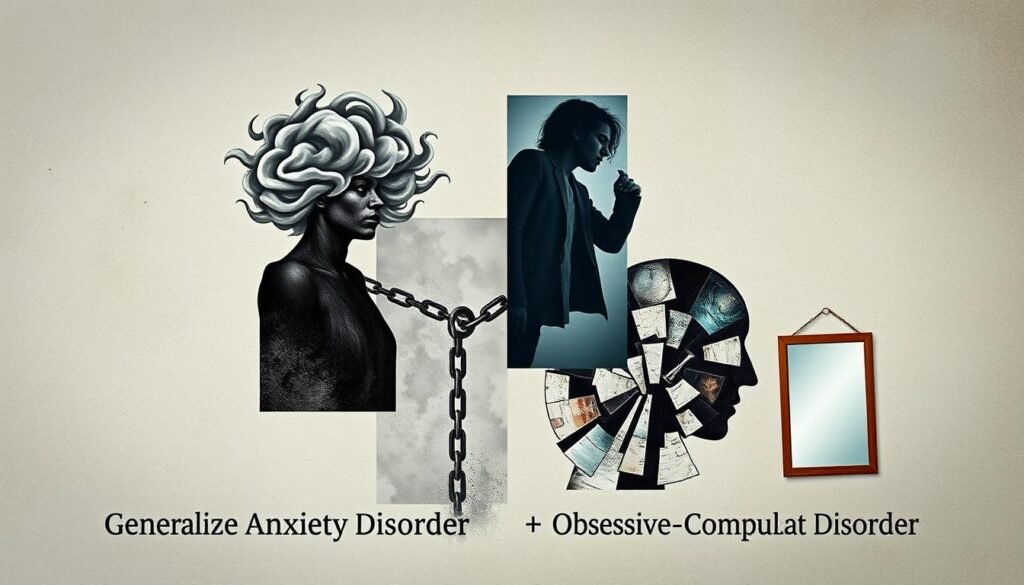Did you know almost 30% of adults face anxiety disorder symptoms at some point? This fact shows how common these disorders are. Unspecified anxiety disorder is especially widespread. It causes a lot of worry and fear about everyday things. It affects many people, making daily life really hard.
Understanding unspecified anxiety is key for those dealing with it. This article will look at symptoms, effects, treatments, and how to cope. Knowing more about unspecified anxiety disorder can help us support those who struggle with it better.
Key Takeaways
- Unspecified Anxiety Disorder affects a significant portion of the adult population.
- Individuals living with anxiety disorder experience excessive worry about daily situations.
- The disorder has various emotional and physical health implications.
- Understanding the symptoms can lead to better management strategies.
- Recognition of this disorder is essential for appropriate treatments.
Understanding Unspecified Anxiety Disorder
Anxiety disorder is complex, especially when it’s called unspecified. This term is for anxiety that doesn’t fit normal categories. It’s important to know symptoms come from genes, environment, and mind.
The National Institute of Mental Health says many anxiety issues come from bad experiences or family history. People with this disorder might feel a range of tough emotions. It’s key to know there are many kinds of anxiety disorders.
Understanding anxiety disorder means looking at stress, personality, and family background. These things mix together to affect someone’s risk. Knowing and tackling these can help in treating anxiety.
Knowing about anxiety is important for helping and treatment. Learning more can lead people to the right help and kindness for those dealing with anxiety.
Symptoms of Anxiety Disorders
Anxiety disorders include a variety of conditions, each with specific anxiety disorder symptoms. Generalized anxiety disorder features constant worry over daily matters. This causes ongoing stress. People may feel always restless and fear something bad might happen, affecting their day-to-day life.
Panic disorder is known for sudden, intense fear moments called panic attacks. During these attacks, one might sweat, feel chest pain, and have a rapid heartbeat. They might also feel disconnected from reality. These strong experiences can put a lot of stress on someone, affecting their overall mental health impact of anxiety disorder.
Social anxiety disorder, or social phobia, leads to severe fear in social settings. It makes people want to avoid social events or interactions. Avoiding these situations can make feelings of loneliness and not being good enough worse.
Specific fears, or phobias, cause strong fear reactions towards certain things or situations. Agoraphobia involves panic in places that seem hard to leave. People with this fear avoid those places.
Adults can have separation anxiety disorder, not just children. It’s a major fear of being apart from loved ones. When apart, it can cause a lot of anxiety. Selective mutism happens in social situations. A person finds they can’t speak. This is often linked to social anxiety.
Sometimes, medication or substances can cause anxiety. The symptoms vary depending on how severe the anxiety is. Symptoms can include:
- Excessive worry
- Restlessness
- Panic attacks
- Increased heart rate
- Gastrointestinal problems
- Issues sleeping
The mental health impact of anxiety disorder is significant and affects many parts of life. As symptoms get worse, people might start avoiding things that make them anxious. Avoiding these can make the fear and stress worse. This makes it hard for them to do normal, everyday activities.

| Type of Anxiety Disorder | Common Symptoms | Impact on Daily Life |
|---|---|---|
| Generalized Anxiety Disorder | Excessive worry, restlessness | Constant tension, difficulty focusing |
| Panic Disorder | Panic attacks, sweating, heart palpitations | Fear of more attacks, avoiding places |
| Social Anxiety Disorder | Big fear in social settings, sweating | Staying away from gatherings, feeling bad about oneself |
| Phobias | Extreme fear, panic when faced with it | Avoiding what causes fear |
Impact of Unspecified Anxiety Disorder
Anxiety disorder is more than just worry or stress. It brings emotional and physical challenges. Recognizing and helping those affected is key.
Emotional and Psychological Effects
The emotional impact of anxiety can change lives. It can make people feel sad and alone, leading to depression. This can harm social life and relationships. Getting the right support is essential.
Physical Health Implications
Those with anxiety often feel physical pain too. They might have chronic pain, headaches, and trouble sleeping. These problems can make their overall health worse. It’s important to see how anxiety affects both mind and body. For more information, check out this research.
Differentiating Unspecified Anxiety Disorder from Other Types
It’s key to compare anxiety disorders accurately for the right diagnosis and treatment. Unspecified anxiety disorder is different from other types like generalized anxiety disorder and panic disorder. It shows symptoms without meeting all criteria for a known diagnosis.
Some people have strong anxiety symptoms but don’t fit the full criteria for Generalized Anxiety Disorder (GAD). This means they can still struggle in their daily lives, similar to those with specific disorders.

Unspecified anxiety differs in the range of its symptoms. For example, panic disorder has clear signs like frequent panic attacks, but unspecified anxiety doesn’t. It’s more varied and harder to pinpoint. This makes it easy to miss when diagnosing.
Specific disorders are well-known and researched. Yet, people with unspecified anxiety need careful attention and the right treatment too. Studies show anxiety varies among groups, like those with schizophrenia. Up to 45% of schizophrenia patients may have anxiety, highlighting the need for tailored treatment.
Treatment should focus on the unique aspect of each anxiety disorder. This means that therapy must be customized to each person. For more info on how mental health diagnoses are made, check out this resource on specified diagnoses.
The Role of Life Events in Anxiety Disorders
Exploring anxiety disorders shows how life events and anxiety link together. Traumatic events deeply affect a person’s mental health. It’s vital to see how past events shape one’s current mental state.
Trauma and Anxiety Connections
Life events and anxiety often connect, particularly with trauma. Events like the loss of a loved one or bullying can lead to anxiety disorders. Recognizing this in young people is key because their anxiety can vary widely.
Studies highlight the need for good assessment methods in kids. While normal fears usually go away, anxiety that’s out of control disrupts daily life. For example, separation anxiety disorder shows how early events impact mental health later.

Social phobia commonly starts in the teen years, and specific phobias in younger kids. Anxiety starting young often continues into adulthood. This makes early help crucial, as teens with anxiety might also face depression or use substances.
Parenting has a big role since anxious kids often act like their anxious parents, hinting at genetics. Hence, knowing how trauma and anxiety link helps in making effective treatment plans.
Managing Symptoms of Unspecified Anxiety Disorder
Dealing with anxiety can feel overwhelming, but there are ways to make it easier. Finding the right coping techniques can change your life. When you tailor these methods to your needs, they work even better.
Coping Strategies for Anxiety Disorder
Many strategies can help with anxiety symptoms. Adding these to your daily life can make you stronger:
- Physical activity: Working out can lessen stress and make you happier.
- Mindfulness practices: Activities like meditation and deep breathing can quiet your mind and lower anxiety.
- Establishing a support network: Being with friends and family provides support when times are hard.
- Healthy lifestyle choices: Eating well, sleeping right, and not having too much caffeine can help with anxiety symptoms.
Seeking Professional Help
If your anxiety is a lot to handle, getting professional help is important. Experts can offer treatments just for you. Getting help early can lessen anxiety’s long-term effects. It’s crucial for anyone struggling to ask for help. Therapy and medicine can really help you recover.
| Strategy | Benefit |
|---|---|
| Physical Activity | Reduces stress and boosts endorphins. |
| Mindfulness Practices | Helps center thoughts and calm the mind. |
| Support Network | Offers emotional reassurance and shared experiences. |
| Healthy Lifestyle Choices | Improves overall well-being and sleep. |
Exploring Treatment Options
Treating unspecified anxiety focuses on improving life quality and reducing symptoms. Medication and psychotherapy are effective together. Knowing the various treatment options helps patients choose wisely.
Medications for Anxiety Disorders
Many medications help lower anxiety symptoms. The most common ones are:
- Selective Serotonin Reuptake Inhibitors (SSRIs): Drugs like paroxetine (Paxil) and sertraline (Zoloft) are great initial choices. They work well for most people.
- Serotonin and Norepinephrine Reuptake Inhibitors (SNRIs): Venlafaxine (Effexor XR) works well for social anxiety. It’s picked when SSRIs don’t work.
- Benzodiazepines: These work quickly to calm anxiety but can be habit-forming.
- Beta Blockers: They help with anxiety’s physical signs, like when speaking in public.
Medications often take weeks to show benefits. Some might need to be taken longer to keep anxiety from returning.
Psychotherapy and Counseling Approaches
Cognitive Behavioral Therapy (CBT) is very good for treating anxiety. It teaches people to recognize and change bad thought habits. Other helpful therapies include:
- Talk Therapy: Talking with a therapist helps process feelings and thoughts.
- Support Groups: Meeting others with similar problems can make you feel less alone.
- Behavioral Therapy: This method slowly exposes you to fears to reduce your worry.
Mixing medication, psychotherapy, and lifestyle changes works best. Exercise and a healthy diet also play important roles. It’s essential to get a plan that fits your specific needs.
The Long-term Consequences of Untreated Anxiety Disorders
Anxiety disorders are common mental health issues. They usually start in childhood or early adulthood. If not treated, they can lead to serious mental and physical problems. Untreated anxiety has many risks, highlighting the need for quick diagnosis and treatment.
Chronic anxiety can cause physical health problems. These include respiratory, gastrointestinal, and cardiovascular issues. The stress affects the body’s key systems over time. Muscle tension from stress can lead to chronic pain, making everyday life harder.
Untreated anxiety can also lead to more mental health issues. Disorders like depression or substance use often occur with anxiety. Long-term anxiety can change brain chemistry and affect emotional health. This makes treatment very important.
The table below shows some effects of not treating anxiety disorders:
| Long-term Consequences | Examples |
|---|---|
| Physical Health Issues | Chronic obstructive pulmonary disease, heart disease, gastrointestinal issues |
| Mental Health Challenges | Depression, substance use disorders |
| Social Impairments | Difficulty maintaining relationships, reduced social engagement |
| Occupational Impairments | Decreased work performance, job loss |
Treating anxiety disorders helps avoid these long-term problems. Therapy, medication, and support can prevent these risks. Early help improves life quality and ensures a healthier future.
For more on the importance of treating anxiety early, visit this resource.
Conclusion
Understanding the impact of unspecified anxiety disorder is important for those affected and their loved ones. Almost a third of adults deal with anxiety at some point. By recognizing symptoms early, you can get help quickly.
Throughout this article, we’ve stressed how critical it is to seek professional advice. Without treatment, anxiety disorders can harm both your mind and body.
The options for managing anxiety disorders range widely. They include medications, psychotherapy, and stress reduction techniques. It’s vital to know help is out there. And that you’re not facing this alone. With the right treatment, the quality of life can get better.
It’s also crucial to be open about mental health issues. Talking about anxiety, its symptoms, and how to cope can build understanding and support. With the correct tools and support, individuals can manage their anxiety. And enjoy more fulfilling lives.